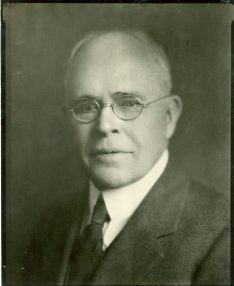Robert T. Hill (1858-1941)
Robert T. Hill was the first professor and chair of the Department of Geology. He was known as the “Father of Texas Geology.” His students collected for the Dumble Survey, and he investigated the geology of most of Texas.
Born in Nashville, Tennessee two years before the start of the Civil War, Hill led a colorful life. He dropped out of school in the sixth grade and went to work for his brother at a newspaper in Comanche, Texas, a wild frontier town. He spent some time as a cowboy on the Dodge City Trail. In his spare time, he collected rocks and fossils and went on to receive a B.S. in geology from Cornell University in 1887. Through some 200 papers, books, and maps, he made significant contributions to the understanding of Texas geology.
In 1921, Hill was an expert witness for Texas in a boundary suit between Texas and Oklahoma. His testimony, along with those of other specialists, permanently won for Texas some 450,000 acres of river-valley lands and over 90 percent of the oil wells along the Red River. He received international attention as one of the first scientists to study the volcano Pelée on the island of Martinique during its catastrophic eruptive cycle of 1902, being the first to describe its classic “glowing cloud.” Hill was an original fellow of the Geological Society of America.
The last ten years of his life, he wrote about science and Texas history for the Dallas Morning News.